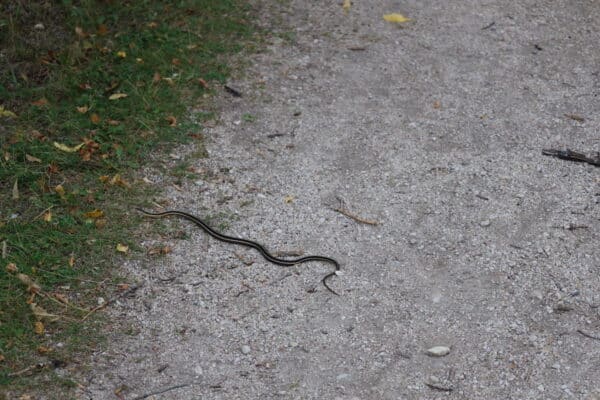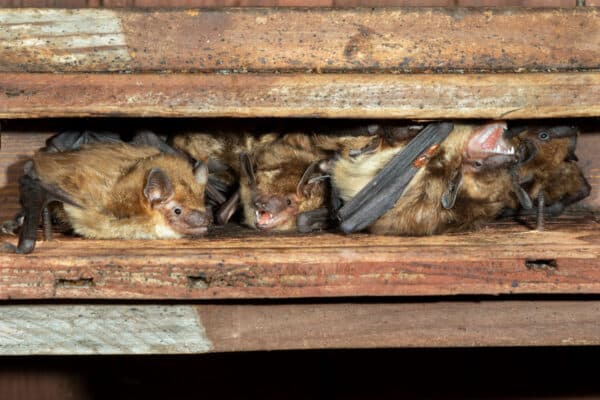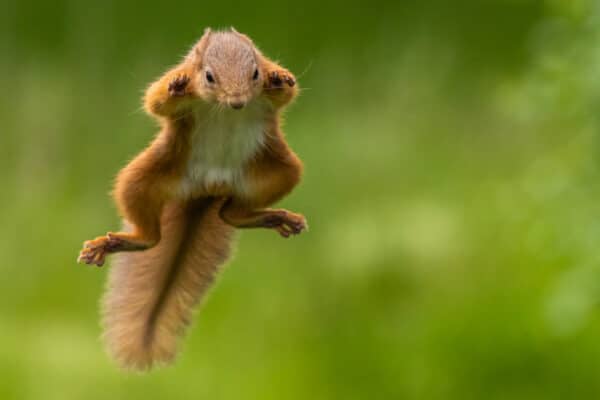As the leaves begin to change and the weather cools down, you might notice an increase in the activity of grey squirrels around your home and property. While these agile creatures are a common sight year-round, they become particularly concerning during the fall.
At Covenant Wildlife, we’ve seen firsthand how grey squirrels can cause significant problems for homeowners, especially in the autumn months.
In this article, we’ll explore why grey squirrels are more active in the fall, the challenges they pose, and how you can prevent potential damage to your home and property.
The Fall Behavior of Grey Squirrels
Grey squirrels, like many wildlife species, are highly attuned to seasonal changes. The onset of fall triggers a flurry of activity, as squirrels prepare for the colder months ahead. Understanding why they become so active during this time is key to addressing the concerns they may cause.
1. Preparing for Winter: Food Hoarding
As temperatures drop and food sources become scarce, grey squirrels enter a phase known as “scatter hoarding.” This is the process of collecting and storing food, such as nuts, seeds, and other foraged items, in various locations to ensure they have enough sustenance during the winter.
During the fall, grey squirrels are especially busy gathering food and burying it in shallow caches across their territory. This activity peaks in late September and October, when they are most active. While it might seem harmless, this behavior often leads them closer to homes and gardens in search of easy food sources.
2. Seeking Shelter: Nesting Behavior
In addition to storing food, grey squirrels are also on the lookout for suitable nesting sites in the fall. They need a warm, secure place to ride out the colder months, which often leads them to target human structures, such as:
- Attics
- Garages
- Sheds
Grey squirrels are adept at finding entry points into homes, such as small gaps, damaged vents, or weak spots in the roofline. Once inside, they can cause considerable damage by chewing on wires, insulation, and wooden beams, as they create nests for the winter.
3. Increased Reproduction
Another reason grey squirrels become a bigger concern in the fall is due to their reproductive cycle. Squirrels typically breed twice a year, with the second litter born in late summer or early fall.
As young squirrels grow and become more independent, they start venturing out to establish their own territories, further increasing squirrel activity near homes and gardens.
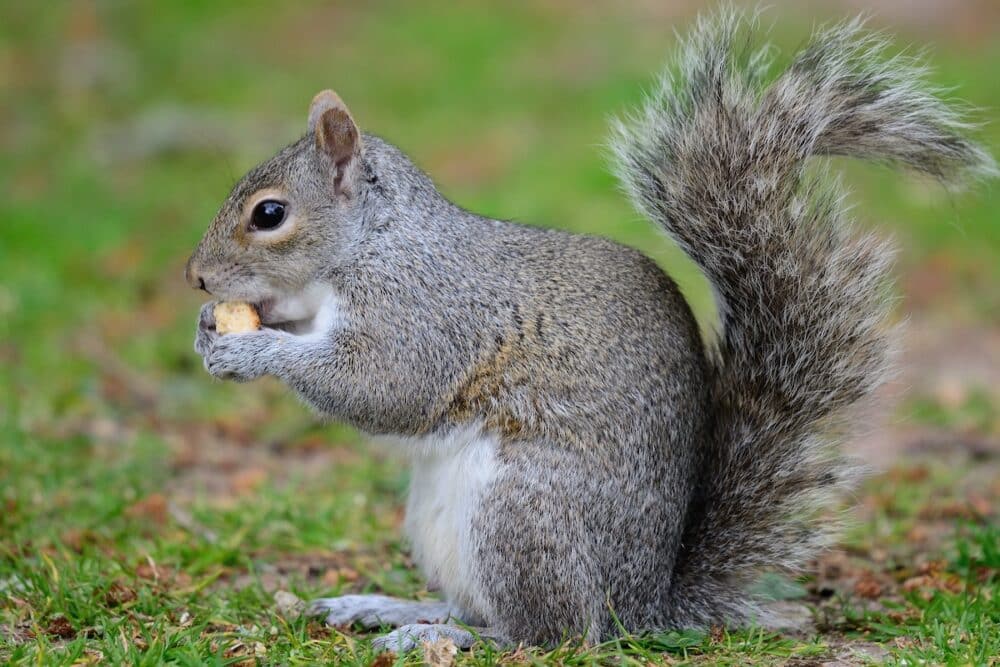
Why Grey Squirrels Are a Concern for Homeowners
While grey squirrels may seem like harmless, furry creatures, their fall behavior can lead to a variety of issues for homeowners. From property damage to health risks, grey squirrels can pose significant concerns during the autumn months.
1. Damage to Homes and Buildings
One of the biggest concerns with grey squirrels in the fall is their tendency to enter homes and buildings in search of shelter. Squirrels are excellent climbers and can easily access roofs, vents, and chimneys. Once inside, they can cause significant damage, including:
- Chewing on electrical wires: Squirrels have strong teeth and a natural instinct to gnaw. Chewing on electrical wires is not only destructive but also poses a fire hazard.
- Damaging insulation: Squirrels often tear up insulation to build nests, leading to reduced energy efficiency and higher heating costs.
- Chewing on wooden beams: In their quest to build nests, squirrels may chew on wooden structures, weakening the integrity of your home.
- Creating entry holes: Squirrels can gnaw through roofing materials, siding, and vents, creating entry holes that allow not only squirrels but also other pests like rats and insects to enter.
2. Contamination and Health Risks
In addition to structural damage, grey squirrels can also pose health risks to humans. Like many rodents, squirrels carry parasites, bacteria, and viruses that can contaminate living spaces. Their droppings and urine can spread diseases such as leptospirosis and salmonella, putting your family and pets at risk.
Squirrel nests inside your home can also attract other pests, including fleas, ticks, and mites, which can spread throughout your house. Once these pests establish themselves, they can be difficult and costly to remove.
3. Destruction of Gardens and Landscaping
Grey squirrels are notorious for digging up gardens and flower beds in their search for food. While this might seem like a minor annoyance, it can lead to the destruction of carefully landscaped yards and gardens. In the fall, when squirrels are actively hoarding food, they may:
- Uproot bulbs
- Chew on young plants
- Cause extensive damage to your outdoor space
Additionally, squirrels can strip bark from trees and shrubs, especially in the fall when they are looking for food and material for their nests. This can weaken trees and make them more susceptible to disease and damage.
4. Noise and Disturbance
If a squirrel manages to get inside your home, it won’t go unnoticed. Squirrels are active during the day, and their constant scratching, gnawing, and scurrying can create a lot of noise, especially if they’ve taken up residence in your attic or walls. The noise can be particularly disturbing early in the morning when squirrels are most active, disrupting your sleep and peace of mind.
How to Prevent Grey Squirrel Problems in the Fall
Given the potential damage grey squirrels can cause, it’s important to take preventative measures to protect your home and property. At Covenant Wildlife, we recommend the following steps to keep squirrels at bay during the fall season:
1. Seal Entry Points
One of the most effective ways to prevent squirrels from entering your home is to seal any potential entry points. Inspect your home for gaps, cracks, or holes around the:
- Roofline
- Vents
- Chimneys
Pay special attention to areas where utility lines enter the house, as squirrels can use these as pathways to gain access.
Use metal flashing, hardware cloth, or steel wool to seal openings, as squirrels are able to chew through wood and plastic materials.
2. Install Squirrel-Proofing Measures
Installing squirrel-proof barriers can help deter these animals from entering your home. For example, you can use chimney caps, vent covers, and attic screens to block access points. Additionally, placing a metal collar around trees near your home can prevent squirrels from climbing onto your roof.
Squirrel baffles can also be used to protect bird feeders and gardens from squirrel interference.
3. Trim Trees and Shrubs
Squirrels use trees and shrubs as bridges to access roofs and attics. To reduce the risk of squirrels entering your home, trim back any overhanging branches or shrubs that are close to your roofline. Keeping trees and plants well-maintained can create a less inviting environment for squirrels looking to build nests.
4. Remove Food Sources
To minimize squirrel activity near your home, remove potential food sources from your yard. Secure trash cans with tight-fitting lids, and avoid leaving pet food or birdseed outside. If you have fruit-bearing trees, regularly collect fallen fruit to prevent squirrels from foraging in your yard.
In your garden, consider planting squirrel-resistant plants such as daffodils, hyacinths, and alliums, which squirrels tend to avoid.
5. Install Motion-Activated Deterrents
Motion-activated devices, such as sprinklers or ultrasonic repellers, can be effective at keeping squirrels away from your home and garden. These devices activate when a squirrel approaches, startling them and encouraging them to move on to a less risky location.
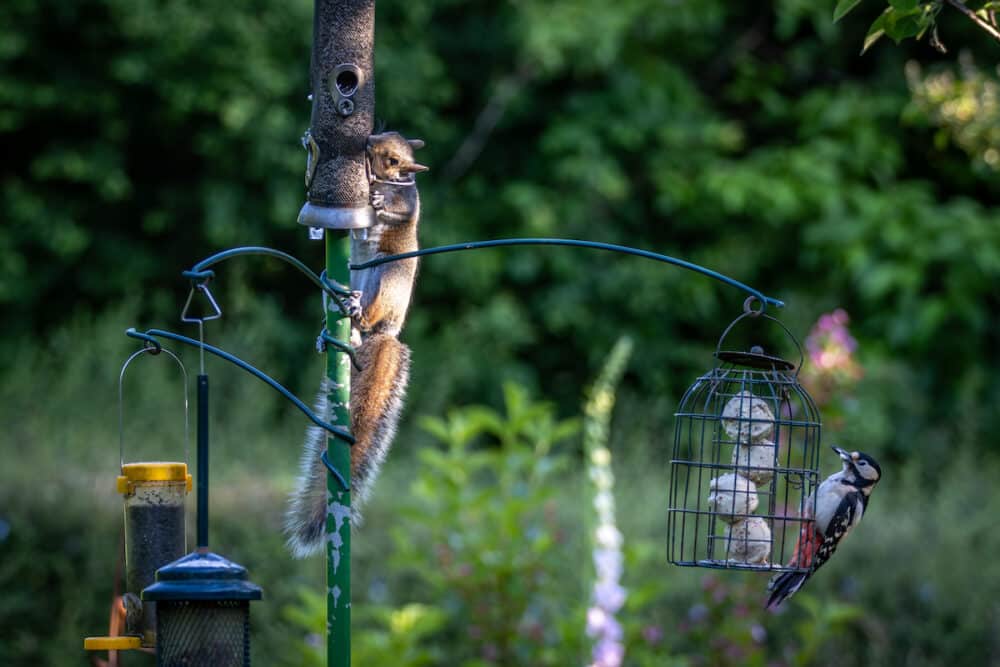
When to Call a Professional to Handle Grey Squirrels
While some homeowners may be able to take preventive measures on their own, a squirrel infestation often requires professional assistance. If you suspect that grey squirrels have already entered your home, then it’s important to act quickly to prevent further damage.
At Covenant Wildlife, our team of experienced wildlife removal experts can safely and humanely remove squirrels from your property. We also offer exclusion services to seal entry points and prevent future infestations. If you hear scratching noises in your attic, find droppings, or notice damage to your roof or siding, then it’s time to call in the professionals.
Covenant Wildlife Can Help Rid Grey Squirrels in the Fall
Grey squirrels are a common nuisance during the fall, as their increased activity leads them closer to homes in search of food and shelter. While these creatures may seem harmless, they can cause significant damage to your property and pose health risks to your family.
By taking preventative measures and calling Covenant Wildlife when necessary, you can protect your home and avoid costly repairs caused by these agile rodents.
